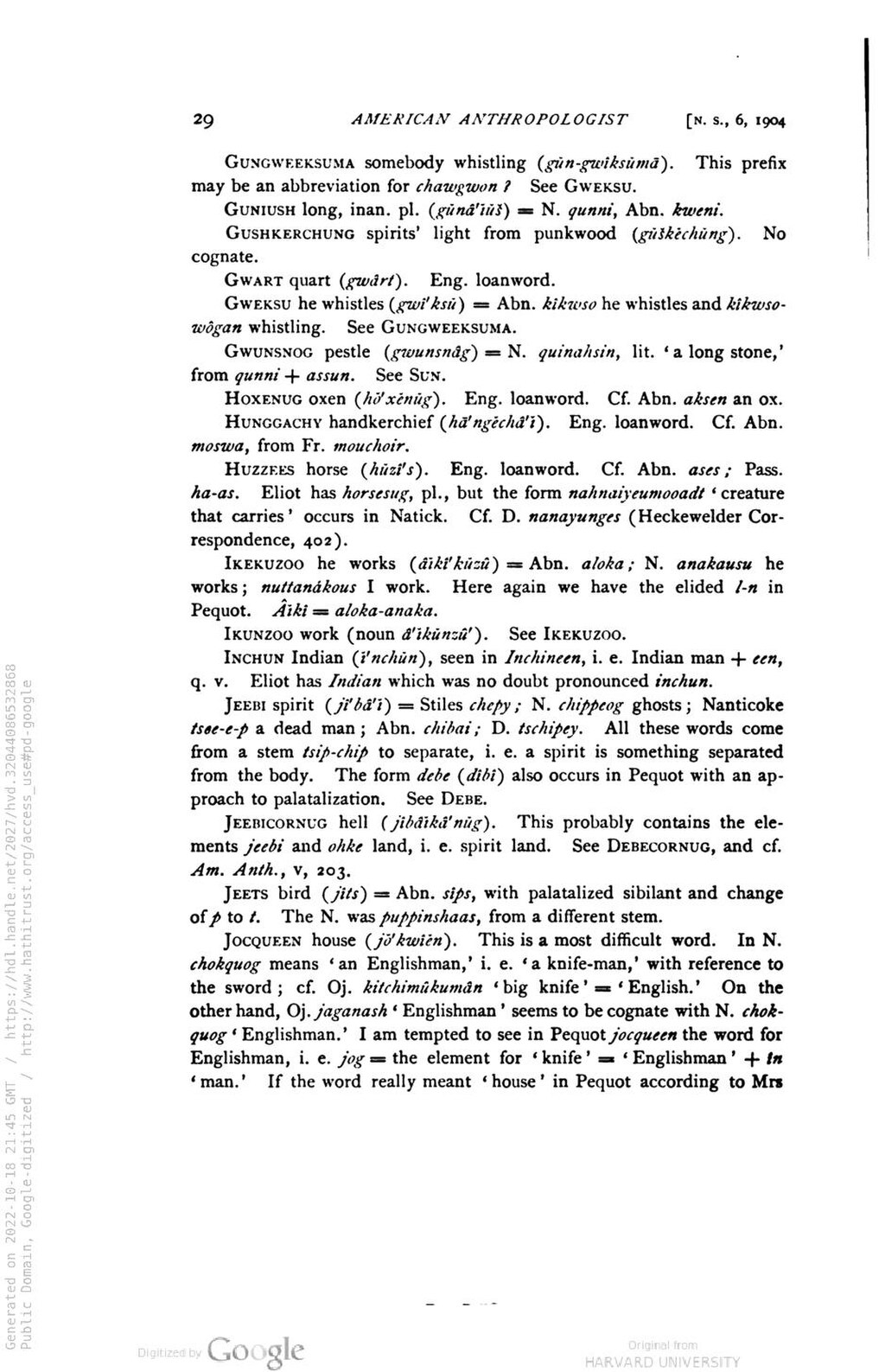Gungweeksuma somebody whistling (gŭn-gwîksŭmā). This prefix may be an abbreviation for chawgwon? See Gweksu.
Guniush long, inan. pl. (gŭnâ'ĭŭš) = N. qunni, Abn. kweni.
Gushkerchung spirits’ light from punkwood (gŭškĕchŭng). No cognate.
Gwart quart (gwârt). Eng. loanword.
Gweksu he whistles (gwî'ksŭ) = Abn. kîkwso he whistles and kîkwsowôgan whistling. See Gungweeksuma.
Gwunsnog pestle (gwunsnâg) = N. quinahsin, lit. ‘a long stone,’ from qunni + assun. See Sun.
Hoxenug oxen (hŏ'xĕnŭg). Eng. loanword. Cf. Abn. aksen an ox.
Hunggachy handkerchief (hā'ngĕchâĭ). Eng. loanword. Cf. Abn. moswa, from Fr. mouchoir.
Huzzees horse (hŭzî's). Eng. loanword. Cf. Abn. ases; Pass. ha-as. Eliot has horsesug, pl., but the form nahnaiyeumooadt ‘creature that carries’ occurs in Natick. Cf. D. nanayunges (Heckewelder Correspondence, 402).
Ikekuzoo he works (âĭkî'kŭzû) = Abn. aloka; N. anakausu he works; nuttanákous I work. Here again we have the elided l-n in Pequot. Âĭkî = aloka-anaka.
Ikunzoo work (noun â'ĭkŭnzû'). See Ikekuzoo.
Inchun Indian (ĭ'nchŭn), seen in Inchineen, i. e. Indian man + een, q. v. Eliot has Indian which was no doubt pronounced inchun.
Jeebi spirit (jî'bâ'ĭ) = Stiles chepy; N. chippeog ghosts; Nanticoke tsee-e-p a dead man; Abn. chibai; D. tschipey. All these words come from a stem tsip-chip to separate, i. e. a spirit is something separated from the body. The form debe (dîbî) also occurs in Pequot with an approach to palatalization. See Debe.
Jeebicornug hell (jîbâĭkâ'nŭg). This probably contains the elements jeebi and ohke land, i. e. spirit land. See Debecornug, and cf. Am. Anth., v, 203.
Jeets bird (jîts) = Abn. sîps, with palatalized sibilant and change of p to t. The N. was puppinshaas, from a different stem.
Jocqueen house (jŏ'kwîĕn). This is a most difficult word. In N. chokquog means ‘an Englishman,’ i. e. ‘a knife-man,’ with reference to the sword; cf. Oj. kitchimûkumân ‘big knife’ = ‘English.’ On the other hand, Oj. jaganash ‘Englishman’ seems to be cognate with N. chokquog ‘Englishman.’ I am tempted to see in Pequot jocqueen the word for Englishman, i. e. jog = the element for ‘knife’ = ‘Englishman’ + în ‘man.’ If the word really meant ‘house’ in Pequot according to Mrs
